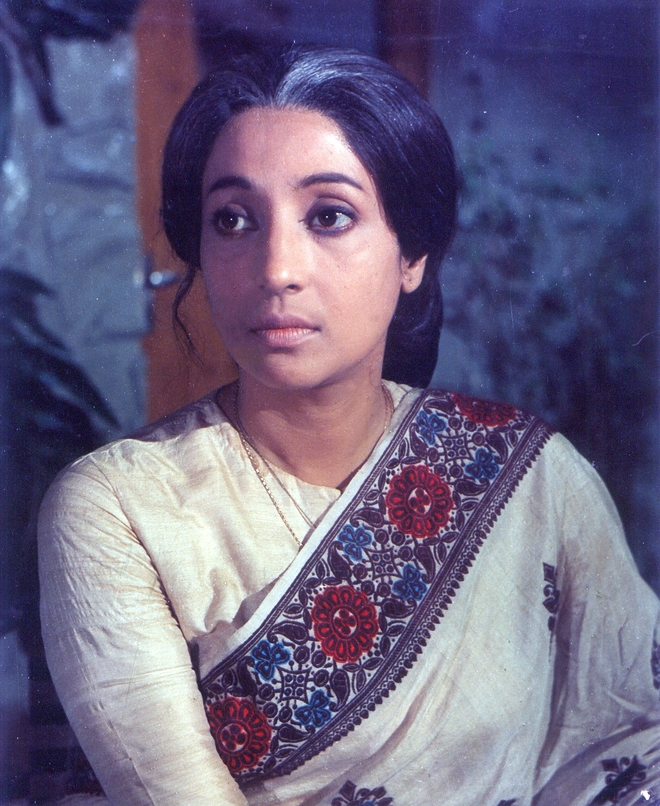Shoma A. Chatterji
aandhi by Gulzar is till date, perhaps the only Hindi film that features the dilemma of a top woman political leader who, by suggestion, might one day become the Prime Minister of the country. Suchitra Sen had never done a role like this in her entire career. Aandhi gave her the opportunity of creating a benchmark for other actresses to follow, or, be inspired by, or, use as a frame of reference. Never since Aandhi has any Hindi film ventured to showcase a woman politician caught between her political aspirations and her emotional pulls to her family the way this film has. In this sense, Aandhi is a unique film. Aandhi celebrates its 40th birthday this year.
Originally, Vyjayantimala was approached for the role much before Gulzar made it with Suchitra Sen. But she confessed that she developed cold feet when she found that the character of Aarti Devi bore remarkable resemblances with then Prime Minister Indira Gandhi. As a great admirer of Gandhi, she was scared to portray a character that appeared to have been modelled along the lines of Indira Gandhi, a decision she regretted for the rest of her career.
Aandhi, adapted from a short story in Hindi by Kamleshwar, tellingly depicted the changing shades of a husband-wife relationship. With the narrative telescoping between the past and the present, the story zeroes in on a politically ambitious wife, who drifts away from her hotelier husband, driven by her powerful, politician father. Aarti Devi’s ambition is not drawn from within but is derived from her father who wishes to pass on his mantle to his daughter.
Nine years later, when the couple meets in a small town where the wife has come on a political campaign, the embers of love are rekindled, leading to a scandal. She wins the election even after she publicly announces her relationship with the man. Gulzar leaves the film open-ended, with the husband spurring her on to go to Delhi, for higher aspirations. The diabolic use of an estranged husband to make political capital out of it on a highly charged election platform is neatly sidetracked in favour of celebrating the image of a slightly repentant wife.
The film was banned because the government under Indira Gandhi during Emergency a few weeks following its release. Reportedly, Indira Gandhi felt that the protagonist’s character bore visible similarities with Indira Gandhi. It had to wait for nearly two years before it got cleared. The ban drew more attention to it. But after Indira Gandhi’s party was defeated in 1977 by the Janata Party, the ban was lifted and it was premiered on a state-run television channel.
A poster in a South Indian daily declared, “See your Prime Minister on screen”. An advertisement in a Delhi daily called the film “the story of a great woman political leader in post-Independence India”.
The Prime Minister herself had not seen the film but felt compelled to ask two of her staff members to watch it before deciding whether it was fit for continued public screening or not. The staff members gave the film a clean chit and I.K. Gujral, who was the Information and Broadcasting minister when the film was shot, too liked what he saw.
Aandhi is also remembered for the music, the songs and their positioning and picturisation. The pre-marriage romance is expressed through two beautiful song sequences — “Is mode pei jaate hain”, sung by Kishore Kumar and Lata Mangeshkwar and “Tum aa gaye ho noor aa gaya hai” also a duet. The song “Tere bina zindagi se koi shikwa nahin” on the soundtrack brings out the inner pain of a couple desperately wanting to cling to each other but not being able to for circumstances beyond their control.
This song was shot against the ruins of the Martand Sun Temple near Anantnag that date back to the 7th-8th century. The locations for the song sequences were chosen to fit into the mood the leading pair was placed in. The happy songs such as “Tum aa gaye ho” was shot around Pari Mahal in Srinagar while “Is mode se jaate hai” was shot at Pahalgam.
Gulzar said, “Aandhi was supposed to be based on the life of Indira Gandhi but this is not true. I looked at it as the first film on a modern Indian politician. We wanted a model and Indira Gandhi and to a lesser extent Tarakeshwari Sinha fitted the bill. But Aandhi had nothing to do with Mrs Gandhi’s personal life. In that sense, Maachis was a more topically political film, which I would not have been able to make some years before I actually made it.”
Unlock Exclusive Insights with The Tribune Premium
Take your experience further with Premium access.
Thought-provoking Opinions, Expert Analysis, In-depth Insights and other Member Only Benefits
Already a Member? Sign In Now











